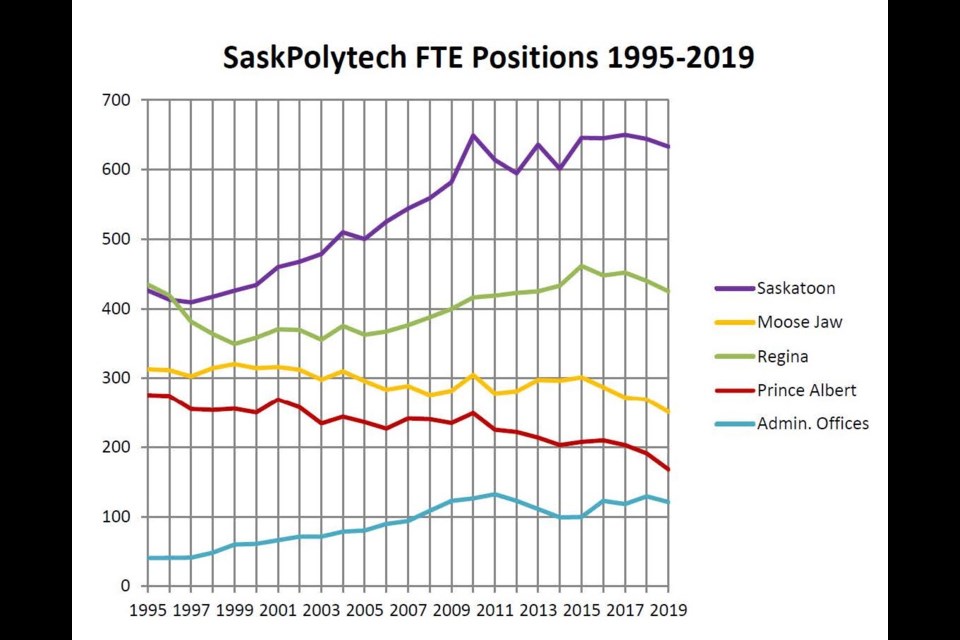The number of provincial government employees who work in Moose Jaw has decreased significantly since 1991, a decline that Coun. Crystal Froese noticed while helping with this year’s PRISM Awards.
The awards have been held at Saskatchewan Polytechnic for the past seven years, but this was the first year where Froese noticed there were no building employees to set up and tear down.
“I’m really concerned about the future of that school in our city. I hear about all these programs being sent to Saskatoon, particularly in the culinary area … . Yet our campus continues to be neglected,” she said during city council’s regular meeting on March 23.
Froese didn’t think the decrease in school staff was related to enrolment since she has heard there is a healthy number of students who attend. She thought it was fundamental for the campus to have building staff, while she didn’t understand why the issue of fewer provincial public employees working here had disappeared.
Council received a report that analyzed how many provincial government employees worked in Moose Jaw from 1991 to 2019, particularly with the Water Security Agency, Valley View Centre, SaskTel and Saskatchewan Polytechnic.
Council voted 6-1 to receive and file the report; Coun. Brian Swanson was opposed since he wanted more action than simply to receive and file.
Saskatchewan Polytechnic
According to the report, in 1999 there were 320.29 full-time equivalent (FTE) staff at the Moose Jaw campus. Last year, there were 251 FTEs. This represents a decrease of 69.29 FTE positions, or 22 per cent, the second-largest decrease after Prince Albert.
In 1999 Moose Jaw’s share of FTE positions across all campuses was 22.7 per cent; last year it was 15.72 per cent.
There were 1,489.52 FTE positions in Saskatchewan Polytechnic in 1995. That number increased slightly to 1,597 FTE positions last year.
The Moose Jaw campus used to be the flagship school of the provincial technical college system, but lately its importance has diminished, said Swanson. He pointed to how Moose Jaw’s share of FTE positions declined while FTE positions throughout the entire system increased. This theme runs throughout the whole report.
It’s not as if there has been a decrease in provincial government jobs over the years, he continued. Instead, there has been an increase in public service jobs and a big decrease in Moose Jaw.
Sask. Poly’s Saskatoon campus has benefited the most during the last 25 years, Swanson said. In 1995 its campus had 426 FTE positions, but last year it had 633 FTEs. Since the administration office is also there, there are 754 FTE positions in total there.
The amount of capital investment spent by Sask. Poly is also telling, he continued. From 1997 to 2019 Moose Jaw received $29.8 million, while Saskatoon — between its campus and administration office — received $135 million.
Sask. Poly spent $276,603 in Moose Jaw last year — the second-lowest amount in the last 25 years. The highest amount was $2.85 million in 2001.
“We are the big losers,” Swanson said.
Valley View Centre and total provincial employees
Another provincial agency that was a major employer was Valley View Centre, he continued. It used to employ 1,000 people, but by 1996 that number was 494 FTEs. Last year — the final year the building housed residents — there were 116 FTEs.
The report also summarizes how many public service employees have worked for the province since 1991, he said. In that year there were 7,224 FTE positions, of which Moose Jaw had 586 FTEs. The provincial number increased to 11,412 FTEs last year, but the community’s share declined to 396 FTEs, a decrease of 317 FTE positions, or 32.4 per cent, during the last three decades. This is the largest decrease by FTE number in the province and second-largest decrease by percentage, after Weyburn.
Moose Jaw’s total share of provincial government jobs now sits at 3.47 per cent, or 396 FTEs; it used to be 8.1 per cent in 1991, or 713 FTEs.
SaskTel and Water Security Agency
“As followers of politics these bad numbers for Moose Jaw can’t be owned by one political party. I think both parties (NDP and Sask. Party) can own them,” Swanson said.
SaskTel has also cut jobs here, from 77 full-time FTE positions in 1999 to 39 full-time FTEs last year, which represents just 1.11 per cent of the total provincial total. Also affected is the Water Security Agency headquarters in Moose Jaw. When the WSA was established in 2012, this community had 84.2 FTE positions, or 51.76 per cent of all WSA jobs. Last year Moose Jaw had 94.5 FTEs with the agency, but only 43.3 per cent of all WSA jobs.
Raising this issue with provincial politicians is important since this is an election year, Swanson said. However, he claimed that during a recent strategy planning meeting, the rest of city council did not support his vision of educating residents about this or lobbying the province about Moose Jaw’s poor treatment.
This should be a priority for council, he thought, especially since it involves the loss of hundreds of jobs and tens of millions of dollars of capital investment.
Health care
One issue the report doesn’t cover is the loss of health-care jobs, said Swanson. When he was first elected in 1988, Moose Jaw had two hospitals and more than 240 beds combined. Now the community has one hospital — with 70 beds — and residents had to pay $20 million of the $100 million total. In comparison, the provincial government will soon build a new $300-million hospital in Prince Albert and those residents won’t have to pay a cent.
The municipality spoke recently with the province and deputy premier about these concerns, said Mayor Fraser Tolmie. He informed the deputy premier that council wants to sit down to discuss these issues.
“Our council isn’t very happy about this,” he added.
The next regular council meeting is scheduled for Monday, April 13.




